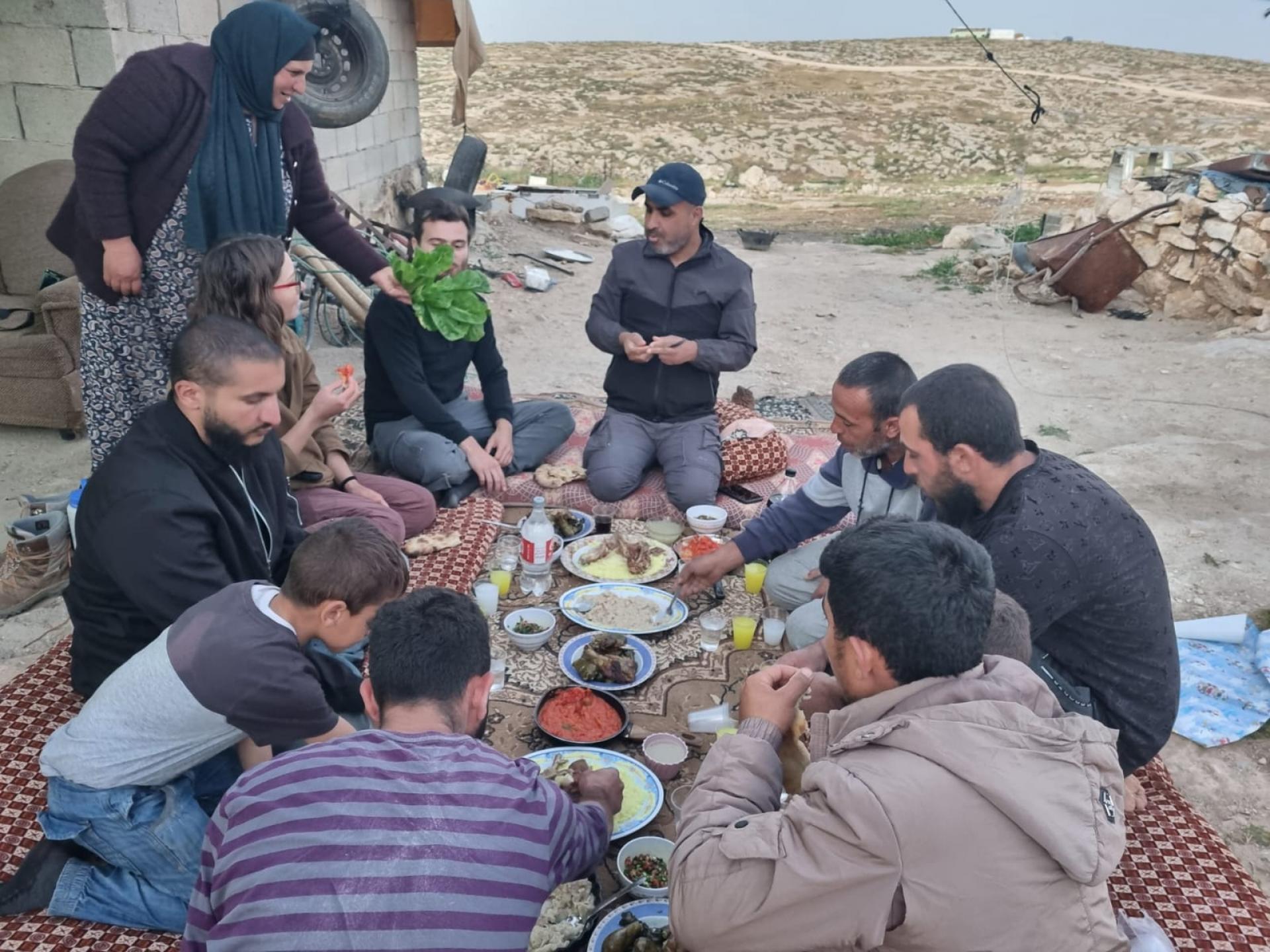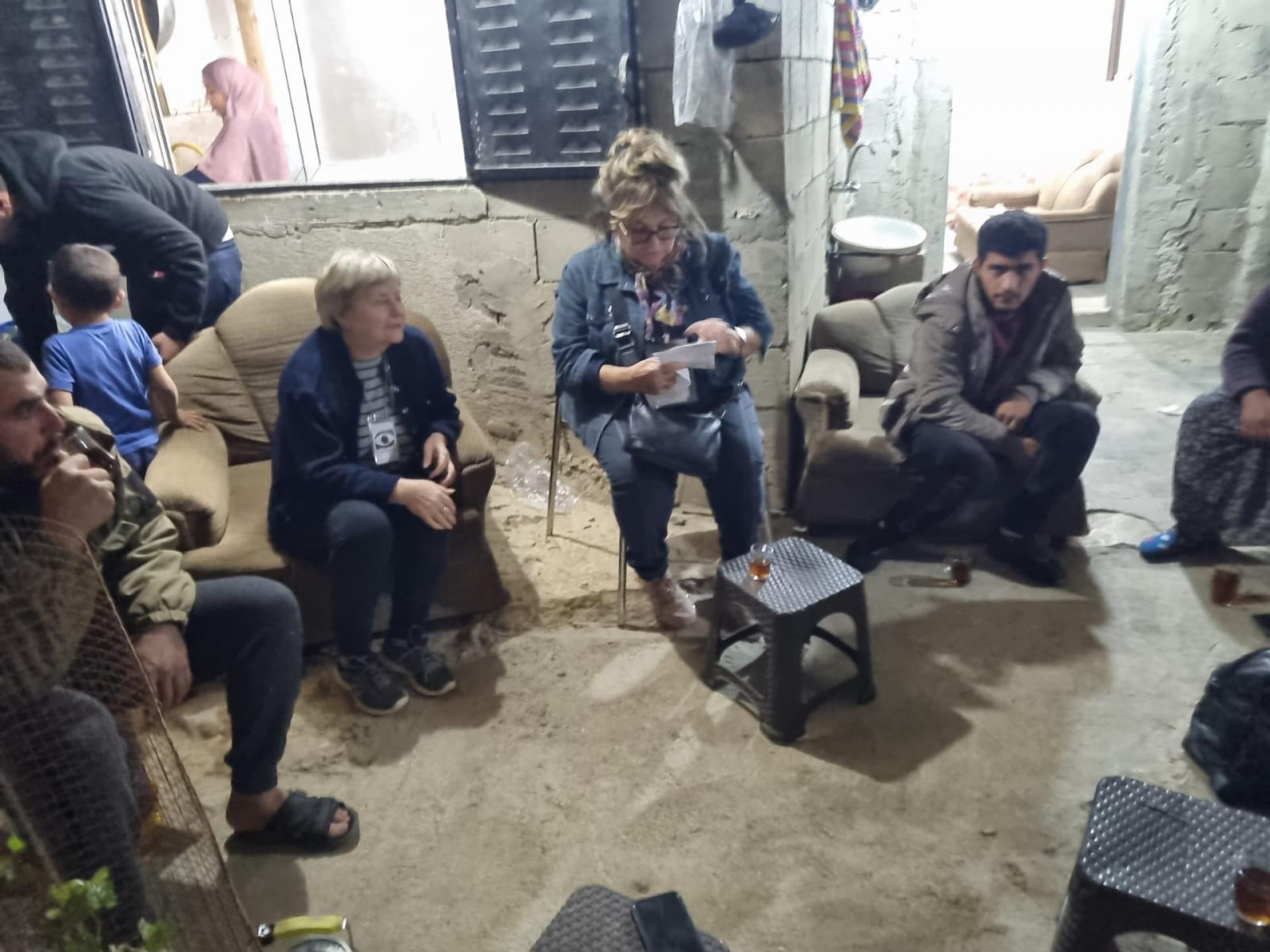Sha’ab al Butum – Iftar with the Jabarin family
As part of our attempt to see and report on the routine of life during this difficult time in general and in the month of Ramadan in particular, we went out in the aftenoon at the invitation of Leila Jabarin for Iftar (the meal after the day of fasting). It was indeed an opportunity to see what was going on with them even in the afternoon, when we are usually not in the area and also to experience the atmosphere of these important days for them in such difficult conditions of the people of Masafer Yatta.
So, first of all we went shopping for them groceries, thanks to your donations. They asked for shampoo and washing powder and other hygienic items that can't be bought besides the food. Not only because there is no money but because they do not have the freedom of movement and the time to get to places where they can buy everything they need in one go. This, in coordination with Erela from the Villages Group, for various things, which they themselves had not had time to buy the night before when they arrived at the Jabarin family.
Because of the rush hour traffic jams, we drove to Ramadin (a village in Area C) very close to Kibbutz Lahav, hoping that there would be an easier way to shop and reach the district for our things later. After we loaded the car with shopping and added them to a lot of clothes and shoes that Smadar collected at Lehavim, we set off.
So as part of the scenery of Ramadan, the road was very congested, and we crawled for half an hour along the small section between Ramadin and the road to the main road. The traffic jam was mainly due to the sudden roadblock that IDF soldiers made there on the way to the road to the Meitar checkpoint. They also delayed us because one of them noticed that we were taking pictures and demanded to delete the picture. But we also had others, it turns out.
The officer asks for IDs and inquires about who we are and where we came from and what we did in Ramadin, even though we are allowed to enter there and what our relationship is. I wondered at the meaning of this investigation and he replied that it was his right to ask, so I explained to him that we had gone to honour the Iftar at our neighbour’s place as friends, and he replied as if he did not understand what Iftar and Ramadan are. I answer that it is the meal that breaks the fast.
“Oh yes, it's their holiday.”
Ignorance is also common among IDF officers who serve in places where a little more understanding and knowledge is required.
"Well go from here, go from here," he said and made a movement with his hand like someone who wants to get rid of some nuisance. We are not late for iftar because it is still summer time. Winter time will apply in the territories only in two weeks.
As usual, we arrived by way of a very difficult and bumpy road. We felt that we were lucky that we did not have to travel this road while pregnant because we would surely have given birth. Our bones were completely shaken up and we laughed.
When we arrived, we were happy to meet young people from new peace organizations that we didn't know, for example there were people from the Center for Jewish Nonviolence. CFJN.
And they told us that a few hours before we arrived, 4 were arrested, two from Israel and two from the US, and were taken to the Kiryat Arba police station for questioning on the grounds that they had interfered with the soldiers/policemen in the performance of their duties, because they had photographed them. A false pretence of course.
It was twilight and still outside at the edge of the vegetable garden plot, settlers were standing, accompanied by an armed "soldier".
Even from the other side those who make the lives of the Palestinians so bitter were watching us through field glasses, the thugs who make life for the Palestinians more bitter day and night.
In the meantime, Leila and the family's daughters prepare a "table" for us and carpets on the floor on which are placed plenty of local foods. We sit with the women and children inside the room. Outside, around carpets on the floor, the men and the volunteers sit around loaded plates.
At the end of the meal, one of the family members came in to inform us that the settlers had finally left. But the father of the family tells us that every night they "get" a visit. They come with flashlights, circle the area, so as to remind these people of their existence.
There was a period after the great destruction caused by the settlers in the first months of the war there, that they were afraid to stay and sleep there. And they slept in a different place every night. Now they have returned to their "home”.
Then there is a pleasant family atmosphere outside. The adults drink coffee and tea and the little ones play ball and other games.
"Wait a little more. We also have sweets with the coffee and tea" they ask, "Erela was here yesterday until 10 at night," says Leila.
A wonderful woman, Erela Dunayevsky.
We didn't stay until 10. Towards 9 we left back home. After a call from my son, Avishai, from home.
"No, I'm not worried, I just wanted to know where you are and when you're coming back."
I didn't exactly explain where we were.
"Not far from the Susiya settlement, everything is fine, don't worry, it's only half an hour from home," I answer.
In kilometers, maybe, but as if on a different planet.
The family isn't really aware of the distance either, and it's impossible to even explain it.


